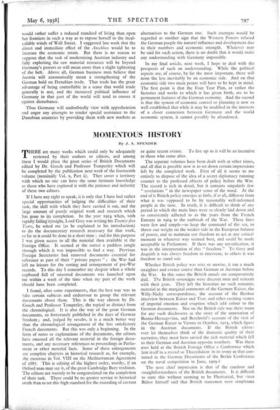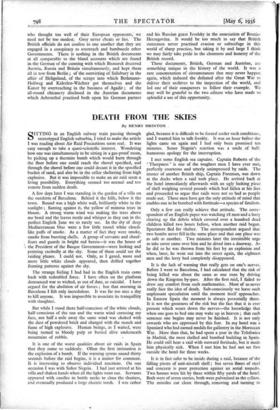MOMENTOUS HISTORY
By J. A. SPENDER
THERE are many works which could only be adequately reviewed by their authors or editors, and among these I would place the great series of British Documents edited by Dr. Gooch and Professor Temperley which will be completed by the publication next week of the fourteenth volume (nominally Vol. x, Part They cover a territory with which no one can have the same intimate knowledge as those who have explored it with the patience and industry of these two editors.
If I have any right to speak, it is only that I have had rather special opportunities of judging the difficulties of their task, the skill with which they have carried it out, and the large amount of purely original work and research which has gone to its completion. In the year 1924 when, with rapidly failineeYesight, Lord Grey was writing his Twenty-five Years, he asked me (as he explained in his introduction) to do the documentary research necessary for that work, so far as it could be done in a short time ; and for this purpose I was given access to all the material then available at the Foreign Office. It seemed at the outset a pathless jungle through which it was impossible to find a way. Previous Foreign Secretaries had removed documents essential for reference as part of their "private papers" ; the War had left no leisure for the sorting and arrangement of pre-War records. To this day I remember my despair when a whole cupboard full of unsorted documents was launched upon me within a week of the time when my part of the work should have been completed.
I found, after some experiments, that the best way was to take certain subjects and endeavour to group the relevant documents about them. This is the way chosen by Dr. Gooch and Professor Temperley, the topical as distinct from the chronological. It is also the way of the great German documents, so fortunately published in the days of German freedom ; and, judged by results, it is a much better way than the chronological arrangement of the ldss satisfactory French documents. But this was only a beginning. In the form of notes or explanations of the documents, the editors have amassed all the relevant material in the foreign docu- ments, and any necessary references to proceedings in Parlia- ment or other material facts. Some of these enlargements are complete chapters in historical research as, for example, the excursus in Vol. VIII on the Mediterranean Agreement of 1887. This is editing of the highest order, worthy, if an Oxford man may say it, of the great Cambridge Bury tradition. The editors are warmly to be congratulated on the completion of their task. There could be no greater service to historical truth than to set this high standard for the recording of current or quite recent events. To live up to it will be an incentive to those who come after.
The separate volumes have been dealt with at other times, and all that is possible now is to set down certain impressions left by the completed work. First of all it seems to me entirely to dispose of the idea of a secret diplomacy running counter to the professed objects of policy before the War. The record is rich in detail, but it contains singularly few " revelations " in the newspaper sense of the word. At the end of it British policy emerges as little, if at all, different from what it was supposed to be by reasonably well-informed people at the time. In truth, it is difficult to think of any period in which the main lines were so clearly laid down and so consistently adhered to as the years from the French Entente in 1904 to the outbreak of the War. These lines were few and simple—to keep the command of the sea, to throw our weight on the weaker side in the European balance of power, and to maintain our freedom to act at any critical moment in whatever way seemed best, and could be made acceptable to Parliament. If there was any mystification, it was in the interpretation of this "freedom." To Grey and Asquith it was always freedom to intervene, to others it was freedom to stand out.
Whether British policy was wise or unwise, it ran a much straighter and evener course than German or Austrian before the War. In this sense the British annals are comparatively dull. The British sovereigns were discreet men and reticent with their pens. They left the historian no such romantic material as the marginal comments of the German Kaiser, the Willy-Nicky correspondence, the account of the Bjorkoe interview between Kaiser and Tsar, and other exciting scenes of imperial emotion and eruption which add colour to the German documents. Nor on the British side was there room for any such disclosures as the story of the annexation of Bosnia-Herzegovina, and Berchtold's account of the visit of the German Kaiser to Vienna in October, 1913, which figure in the Austrian documents. If the British editor3 ever let themselves think of the dramatic quality of their narrative, they must have envied the rich material which fell to their German and Austrian opposite numbers. Was there ever held at the British Foreign Office a Conference which lent itself to a record so Thucydidean in its irony as that con- tained in the German Documents of the Berlin Conference on the naval competition in June, 1909?
The next chief impression is that of the candour and straightforwardness of the British documents. It is difficult to state this without seeming to be Pharisaical, but F ince Billow himself said that British statesmen were simpletons who thought too well of their European opponents; we need nor be too modest. Grey never cheats or- lies. The British officials do not amfess to one another that they are engaged in a conspiracy to overreach and bamboozle other Governments. There is nothing in the British documents at all comparable to the bland accounts which are found in the German of the cunning with which Bismarck deceived Austria, Russia and Britain simultaneously, and kept them all in tow from Berlin ; of the outwitting of Salisbury in the affair of Heligoland, of the scrape into which Bethmarm- Hollweg and Kiderlen-Wichter got themselves and the Kaiser by overreaching in the business of Agadir ; of the all-round chicanery disclosed in the Austrian documents which Aehrenthal practised both upon his German partner and his Russian' gist livolsky in the aluidiatieh Of Bosnia-- Herzegovina. It Would be too much to say that British statesmen never practised' evasion or subterfuge in this world of Sharp practice, but taking it by and large" I think we may fairly take pride in the cleanness and honesty of the British record.
These documents, British, German and Austrian, are something unique in the history of the world: It was a rare concatenation of circumstances that may never happen again, which induced the defeated after the Great War to deliver their archives to the inspection of the world, and led one of their conqUerors to follow their example. We may well be grateful to the two editors who have made so splendid a use of this opportunity.



































































 Previous page
Previous page